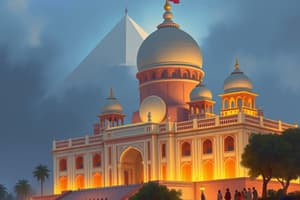Podcast
Questions and Answers
What is the definition of sovereignty in political science?
What is the definition of sovereignty in political science?
- The influence of foreign powers in domestic policy.
- The establishment of legal frameworks in governance.
- The power to govern a territory without external interference. (correct)
- The acceptance of a government’s right to rule.
Which of the following is a key principle of liberalism?
Which of the following is a key principle of liberalism?
- Emphasis on social equality and community ownership.
- The protection of individual freedoms and rights. (correct)
- The primacy of the state over individual rights.
- A focus on national superiority and aggression.
What is the main role of the Election Commission in India?
What is the main role of the Election Commission in India?
- To provide diplomatic services.
- To supervise and ensure free and fair elections. (correct)
- To create and enforce laws.
- To conduct foreign policy.
Which of the following is NOT a feature of the Indian Constitution?
Which of the following is NOT a feature of the Indian Constitution?
What defines political ideologies?
What defines political ideologies?
What major theory focuses on the role of power in international relations?
What major theory focuses on the role of power in international relations?
Which of the following best describes the role of civil services in governance?
Which of the following best describes the role of civil services in governance?
Which of these is considered a variant of nationalism?
Which of these is considered a variant of nationalism?
Flashcards are hidden until you start studying
Study Notes
Overview of Political Science Class 12 - Bihar Board
Key Topics Covered
-
Political Theory
- Definition and scope of political theory.
- Key concepts: Power, authority, legitimacy, sovereignty, and state.
-
Political Ideologies
- Liberalism: Principles and critiques.
- Socialism: Historical development and contemporary relevance.
- Fascism: Characteristics and impact.
- Nationalism: Variants and significance.
-
Indian Government and Politics
- Constitution of India: Features and significance.
- Fundamental Rights and Duties.
- Structure of Indian Government:
- Executive, Legislature, Judiciary.
- Role of the President, Prime Minister, and the Cabinet.
-
Elections and Political Parties
- Election process in India:
- Types of elections (General, State, Local).
- Role of the Election Commission.
- Political parties:
- National vs. regional parties.
- Functions and importance of political parties.
- Election process in India:
-
Public Administration
- Definition and scope.
- Importance of bureaucracy.
- Role of civil services in governance.
-
International Relations
- Basic principles of international relations.
- Major theories: Realism, Liberalism, Constructivism.
- Current global issues and challenges.
Key Concepts
- Sovereignty: Ultimate authority in a territory.
- Legitimacy: Acceptance of government’s right to rule.
- Bureaucracy: Administrative system managing government operations.
Important Themes
- The relationship between citizens and the state.
- Impact of globalization on national and local politics.
- Role of civil society and interest groups in democracy.
Examination Preparation Tips
- Understand and memorize key definitions and concepts.
- Review major political ideologies and their proponents.
- Analyze the structure and functions of the Indian political system.
- Keep current with contemporary political issues for application in essays.
Suggested Study Methods
- Create mind maps of key concepts.
- Engage in group discussions to deepen understanding.
- Practice past exam papers for revision.
- Note important case studies and examples for better retention.
Political Theory
- Political theory explores ideas about power, governance, and the relationship between individuals and the state.
- Key concepts include:
- Power: The ability to influence or control others.
- Authority: Legitimate and recognized power.
- Legitimacy: Public acceptance of a government's right to rule.
- Sovereignty: Supreme authority within a territory.
- State: A political entity with a defined territory, population, and government.
Political Ideologies
- Liberalism: Advocates individual rights, limited government interference, free markets, and democratic principles.
- Socialism: Emphasizes social equality, collective ownership of resources, and government intervention in the economy.
- Fascism: Characterized by authoritarianism, nationalism, and suppression of opposition.
- Nationalism: A strong sense of identity and unity among people sharing a common culture, language, or history.
Indian Government and Politics
- The Constitution of India establishes a federal, parliamentary democracy, and guarantees fundamental rights and duties to citizens.
- Key features of the Indian Constitution:
- Federalism: Power sharing between the central and state governments.
- Parliamentary system: The executive (Prime Minister and Cabinet) is accountable to the legislature (Parliament).
- Separation of powers: Checks and balances between the Executive, Legislature, and Judiciary.
- Fundamental Rights: Six categories of rights ensuring individual liberty, equality, and justice.
- Fundamental Duties: Ten duties outlining the responsibilities of citizens towards the nation.
Elections and Political Parties
- India holds regular elections - general, state, and local - based on universal adult suffrage (the right to vote for all adults).
- The Election Commission oversees the fair and transparent conduct of elections.
- National parties: Have widespread support across the country.
- Regional parties: Focused on specific states or regions.
- Functions of political parties: Representing citizens, formulating policies, contesting elections, and forming governments.
Public Administration
- Public administration is the management and implementation of public policies and programs.
- Bureaucracy: A system of hierarchical organization with specialized tasks and procedures.
- Civil Services: Professional government officials responsible for carrying out administrative tasks.
International Relations
- International relations analyzes the interactions between states and other international actors on a global scale.
- Key theories:
- Realism: Emphasizes state power, national interest, and security.
- Liberalism: Focuses on cooperation, international institutions, and interdependence.
- Constructivism: Highlights how shared norms, ideas, and identities shape state behavior.
- Contemporary global issues: Climate change, terrorism, globalization, and economic inequality.
Studying That Suits You
Use AI to generate personalized quizzes and flashcards to suit your learning preferences.



